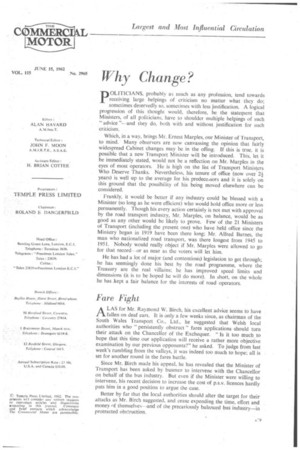Why Change?
Page 31

If you've noticed an error in this article please click here to report it so we can fix it.
pOLITIC1ANS, probably as much as any profession, tend towards receiving large helpings of criticism no matter what they do; sometimes deservedly so, sometimes with less justification. A logical progression of this thought would, therefore, be the statewent that Ministers, of all politicians, have to shoulder multiple helpings of such "advice "—and they do, both with and without justification for such criticism.
Which, in a way, brings Mr. Ernest Marples, our Minister of Transport, to mind. Many observers are now canvassing the opinion that fairly widespread Cabinet changes may be in the offing. If this is true, it is possible that a new Transport Minister will be introduced. This, let it be immediately stated, would not be a reflection on Mr. Marples in the eyes of most operators. He is high on the list of Transport Ministers Who Deserve Thanks. Nevertheless, his tenure of office (now over 21 years) is well up to the average for his predece,,sors and it is solely on this ground that the possibility of his being moved elsewhere can be considered. .
Frankly, it would be better if any industry could be blessed with a Minister (so long as he were efficient) who would hold office more or less permanently. Though his every action certainly is not met with approval by the road transport industry, Mr. Marples, on balance, would be as good as any other would be likely to prove. Few of the 21 Ministers of Transport (including the present one) who have held office since the Ministry began in 1919 have been there long; Mr. Alfred Barnes, the man who nationalized road transport, was there longest from 1945 to 1951. Nobody would really object if Mr. Marples were allowed to go for that record--or as near as the voters will let him.
He has had a lot of major (and contentiotis) legislation to get through; he has seemingly done his best by the road programme, where the Treasury are the real villains; he has improved speed limits and dimensions (it is to be hoped he will do more). In short, on the whole he has ,kept a fair balance for the interests of road operators.
Fare Fight
ALAS for Mr. Raymond W. Birch, his excellent advice seems to have fallen on deaf ears. It is only a few weeks since, as chairman of the South Wales Transport Co., Ltd., he suggested that Welsh local authorities who "persistently obstruct" fares applications -should turn their attack on the Chancellor of the Exchequer. "Is it too much to hope that this time our application will receive a rather more objective examination by our previous opponents?" he asked. To judge from last week's rumbling from the valleys, it was indeed too much to hope; all is set for another round in the fares battle.
Since Mr. Birch made his appeal, he has revealed that the Minister of Transport has been asked by busmen to intervene with the Chancellor on behalf of the bus industry. But even if the Minister were willing to intervene, his recent decision to increase the cost of p.s.v. licences hardly puts him in a good position to argue the case.
Better by far that the local authorities should alter the target for their attacks as Mr. Birch suggested, and cease expending the time, effort and money of themselves--and of the precariously balanced bug industry—in protracted obstruction.




















































































































